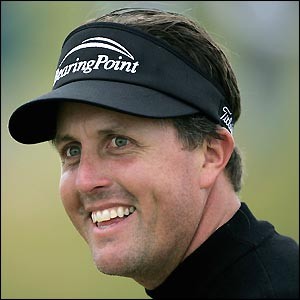With Tiger Woods now battling midlife demons, no player on the PGA Tour fills a gallery like Phil Mickelson. And the biggest galleries Mickelson sees this month, it turns out, will be right here in Memphis at the FedEx St. Jude Classic. The 46-year-old Hall of Famer will skip next week’s U.S. Open so he can attend his daughter Amanda’s high school graduation. (As class president, Amanda will speak at the ceremony.) With the Open concluding on Father’s Day, as it does every year, Mickelson is sharing some perspective on family and career that goes well beyond fairway-splitting drives or a smooth putting stroke.
Don’t forget, the U.S. Open is Mickelson’s white whale. He’s won each of golf’s other three majors, but has never been crowned this country’s national champion. He’s come tantalizingly close, finishing second on Father’s Day six times (first in 1999, most recently in 2013).

And Mickelson is 46. The oldest man to win the U.S. Open? Hale Irwin, who did so at age 45 in 1990.
All this is to say: relish Phil Mickelson’s visit to the TPC Southwind course this week. This winner of five majors has become a regular in recent years at the FESJC, and is an eye-popping example of how superstars sell tickets. I’ve walked the Southwind course with groups ahead of Mickelson’s in which you can listen to the conversation between a player and his caddie. I’ve stopped to wait for Mickelson to arrive and it’s like an organized march ensues, younger fans sprinting ahead for a prime viewpoint along the rope or near the next green. Mickelson is a one-man brand in a sport lacking the built-in marketing tool that is a team nickname. He earns every dime he’s paid by sponsors, every check he cashes at the end of a tournament.
Mickelson tied for second at last year’s FESJC, three strokes behind first-time winner Daniel Berger. Here’s hoping he takes the winner’s check home this Sunday. It would be a nice graduation gift for Amanda.
• This week’s tournament marks the 60th consecutive year the PGA has called Memphis home for a week. Among the FESJC’s 10-year anniversaries, which tournament is most memorable? Curtis Strange won the 30th event (then the Danny Thomas Memphis Classic) in 1987. Ten years later, the Shark himself, Greg Norman, took the winner’s check. But I’d have to go with the 1977 event, in which Al Geiberger won by virtue of the first 59 in PGA Tour history. Geiberger didn’t break 70 in any of his other three rounds, but that epic Friday at Colonial Country Club made him a Memphis sports deity.
• This will be the first FESJC since longtime tournament director Phil Cannon died last October. If you’re among the thousands who enjoy the comforts of TPC Southwind this week, remember Phil and the impact he made over his four decades of involvement with the event. A convenient concession stand on the back nine? That’s Phil. A volunteer handing out free lip balm as the mercury rises? That’s Phil. Proximity to the best golfers in the world while feeling right at home? That’s Phil Cannon.